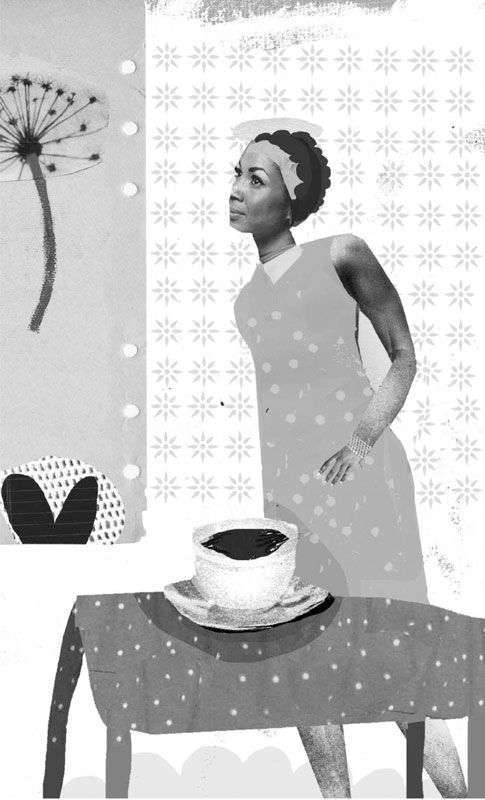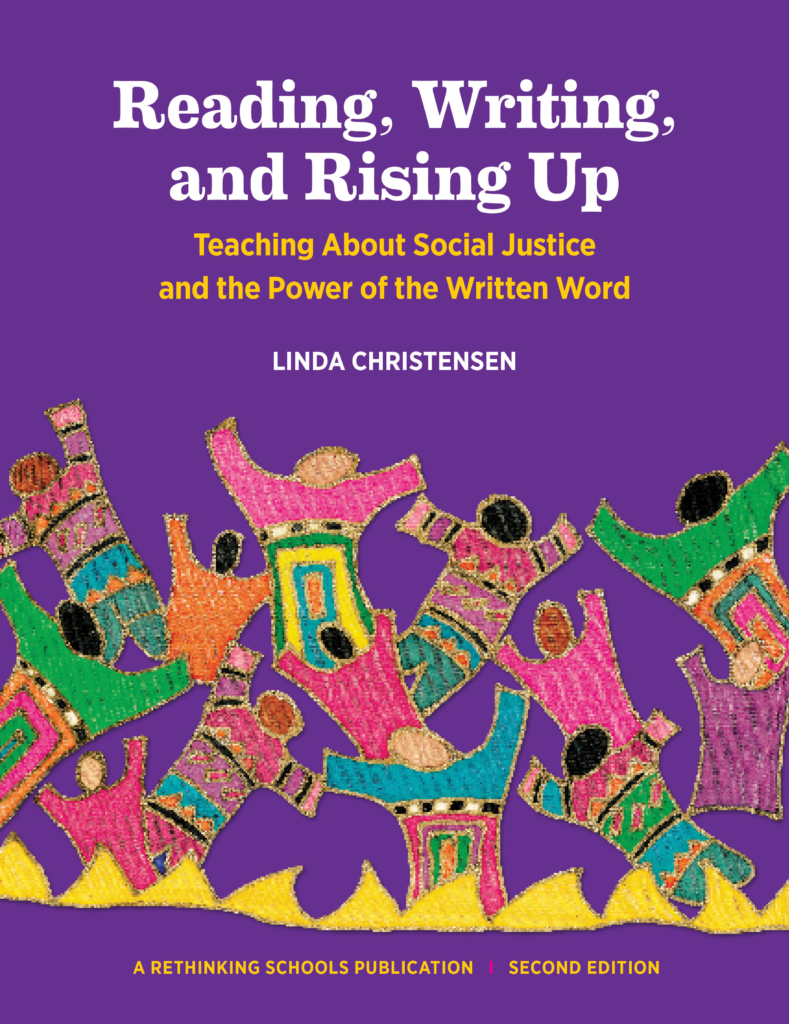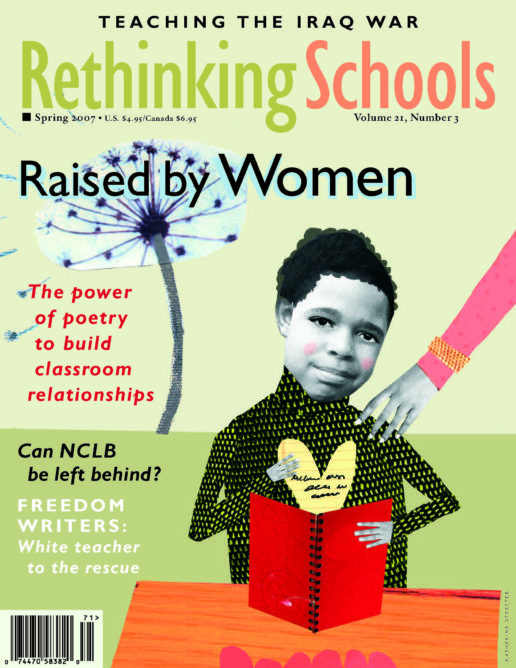Raised by Women
Building relationships through poetry
Illustrator: Katherine Streeter

When I first read “Raised by Women” by Kelly Norman Ellis, I knew the poem would be a hit with my students. I love Ellis’ celebration of the women in her life, her use of home language, and the wit and wisdom of her rhythmic lines. And from reading student tributes to their mothers over the years, I knew most of my students — predominantly African-American, in an 11th-grade African-American literature class at Grant High School in Portland, Ore. — would relate to the topic. “Raised by Women” also had the qualities I look for in poems I use to build community and teach poetic traits: A repeating line that lays down a heartbeat for the students to follow, delicious details from the writer’s life that could evoke delicious details from my students’ lives, and a rhythm so alive, I want to dance when I read it.
Part of my job as a teacher is to awaken students to the joy and love that they may take for granted, so I use poetry and narrative prompts that help them “see” daily gifts, to celebrate their homes and heritages. Ellis’ poetry provides a perfect example. As she wrote, “I was just lucky enough to have been born into a loving southern, black family. I want these poems to stand as witness to the beauty and abundance of that life: a black southern woman’s life, a good life, a proud life, a life as rich and sweet as the pies I bake with Mississippi pecans. There are others like me, folks raised in the brown loving arms of family.”
I also use poetry to build relationships with students and between students. Ellis’ smart and sassy poem helped launch our year-long journey to establish relationships as the students and I learned about each other.
In each stanza of the poem, Ellis lists the kinds of women who raised her — from “chitterling eating” to “some PhD toten” kind of women. Ellis’ poem follows a repeating, but changing pattern. She writes that she was raised by women, sisters, and queens. She includes both description and dialogue in most stanzas:
I was raised by
Chitterling eating,
Vegetarian cooking,
Cornbread so good you want to lay
down and die baking
“Go on baby, get yo’self a plate”
Kind of Women.
The full poem can be found here.
Filling the Bucket with Delicious Details and Style
After reading “Raised by Women” twice, I asked students, “Who were you raised by?” Although Ellis discusses only women, I wanted to open other possibilities. I salted the pot by generating a few: mother, father, coaches, church. But I also wanted them to reach out beyond the traditional, so I encouraged them to think about neighbors, neighborhoods, musicians, novelists, civil rights activists, the halls at Grant. After students wrote their lists, we shared them out loud so they could “steal” more ideas from each other. I pushed students to get more specific as they shared. For example, when Melvin said, “Coaches,” I asked which coaches raised him — all of them? What did his football coach say or do that helped raise him? When Alex said the men at the barbershop, I asked which men and what did they contribute. Because the best poetry — and writing in general — resides in specific details, I pushed students to move beyond their first response and get deeper.
We also looked at other verbs they could use besides “raised.” Students generated a list: brought up, taught, educated, nurtured. I wanted them to see that they weren’t limited by the original verb, raised.
When we completed our initial brainstorming about the repeating line, we went back to the poem and noticed the specific kinds of details that Ellis included: The first stanza was about food, the second stanza focused on hair, the third was about physical appearance — skin color and clothes — the fourth about choices, the fifth about music, the sixth about attitude, and the seventh about professions. Because I didn’t want each poem to turn out the same, I used those as potential categories. We also brainstormed others: cars, songs, languages. I encouraged them to create a list of categories like Ellis’ — food, clothes, music — and to fill in each category with specific details. After they brainstormed, we returned to the form — looking at the repeating, but changing line — and the use of dialogue that gives Ellis’ poem so much flavor. We also noted that she named specific people — Angela Davis and James Brown — which was something they could do in their poems. Students pointed out that Ellis used home language rather than standard English. Because I knew that some students’ home language was Spanish, I encouraged students to experiment with language in their poems. Students started their poems in class and completed them at home.
For more articles like this, check out Reading, Writing, and Rising Up by Linda Christensen.
The Read-around:
Structuring Response
Before the students read their poems, we arranged the desks in a circle, so students could see and hear the reader. I asked students to pull out a piece of paper to take notes on what they learned about each classmate through their poem: “Who raised them? What’s important to them? Who’s important to them?” I discovered that students pay more attention during the read-around if I give them a specific task. For the most part, student poems were stellar, and even those that lacked the style and sassiness of their classmates’ gave us a glimpse into their lives.
Students found their own ways into the poems by celebrating more than one person. Anaiah Rhodes, for example, wrote a stanza each for her mother and father, grandmother and grandfather, church folk, music, cousins, and track. Her classmates loved how she used language and details to capture each one in turn, but they especially loved how Anaiah wrote about her church:
I was taught by a tongue talkin’
Sanctified, holy ghost filled, fire baptized, shoutin’
“‘Member to keep God first, Baby!”
Kinda church folkSome aisle runnin’, teary-eyed, joy jumpin’,
Devil rebukin’, seed sowin’
“How you doin, Baby?”
Type of church folk
Ellis’ poem provided an opportunity for us to celebrate the brilliance and linguistic richness of my students’ cultures. Destinee Sanders, who also chose to write about a variety of people in her family — mother, aunts, sisters, and “abuelita” — switched languages throughout her poem:
I was raised by Mi Abuelita,
Es mi abuela favorita,
Ella es mi corazón, mi amor, mi amiga
Mi noche, mi todos los días, mi siempre.
Yo amo a mi abuelita[I was raised by my Grandma,
My favorite grandmother
She is my heart, my love, my friend
My night, my everyday, my always.
I love my grandma]
Like Destinee, students shared information in the poem that helped us know their family and backgrounds. Jessica Chavez wrote about her “tortilla making/Grease usin’/cumbia dancin'” family. Adiana Wilmot wrote, “I was raised by that/curry goat and chicken cookin’/ ‘Eat your vegetables, pickney,’/type of Jamaican woman.” Kirk Allen wrote about his family — the Allens — rather than selecting out individuals:
I was raised by the gas, brake dipp’n,
Cadillac whip’n, Wood grain grip’n,
Old school, big body, pimp’n,
Ain’t you bullshit’n AllensI was raised by the show stopp’n,
Calla poll’l
Hater droppin’,
Hat tilted to the side,
Look like a bad mutha,
Shut yo mouth Allens
In this and all class writing, I encouraged students to abandon the prompt and my suggestions and find their own passion and their own way into the assignment. Shona Curtis did that and forged her way to a poem about music instead of people:
I was raised by smooth jazz
Make you want to sit down and
Cry kind of musicSome move your feet and shake
Those hips feel like you dancin’
Down the streets of Argentina
Kind of music
When students wrote at the end of the assignment, many pointed to Shona’s straying from the prompt as a strength in her poem.
Details from poems brought shouts of laughter or nods as students recognized their own family in Destiny Spruill’s description of her family’s “Found Jesus/Church goin’/You mouth can get you in trouble” and “Gumbo makin’/Hat wearin’/Mother of the church/Kinda grandmothers.” They understood Ebony Ross’ “I was raised to get the belt/If I was talking that lip.” But it was Jessica’s repeating line, “I wasn’t raised by my daddy” that brought the most affirmations from other students.
Framing Reflection:
Milking the Learning
After students shared, I handed out 3×5 cards and asked them to look back over their notes and write about what they learned about each other and poetry through our lesson. Kayla Anderson wrote that she learned “that you can completely change a poem but still keep the meaning. Shona made her poem fun by using words like ‘hip-hoppin,’ pop lockin’, shake your dreads.'” She noted that many students used strong verbs and imagery. Shona pointed out that “when you say your poem with attitude it sounds better.”
But it was students’ revelations about each other that made me realize this poetry assignment is a keeper. Students wrote about how much they learned about each other in a short amount of time. “I learned that Adiana is from Jamaica, that Bree was raised by foster parents, and that a lot of us have been let down by our fathers.” Destinee wrote:
I learned that I have something in common with every single person in this room. I realize that we have all been through a lot of the same things. I learned that most of us weren’t raised by our dads. I learned that Shaquala loves soul food. I learned that although Bree is Latino like me, she was raised by different types of Latinos, and I can relate to that… I learned that we’re different… yet we’re the same.
Out of the 30 students in the class, the majority were raised without fathers. This became a repeating “aha” for most of the class. Virginia Hankins, for example, wrote that she “learned a lot about my classmates that I would have never known. I was surprised that so many of us were raised without our fathers.”
One lesson isn’t enough to build the kind and caring classroom I’m striving for, but knitting together poetry that teaches about our lives as well as the craft of writing starts to build the kind of caring, risk-taking community I hope to create by the end of the year.
Raised by Women
By Kelly Norman Ellis
I was raised by
Chitterling eating
Vegetarian cooking
Cornbread so good you want to lay
down and die baking
“Go on baby, get yo’self a plate”
Kind of Women.
Some thick haired
Angela Davis afro styling
“Girl, lay back
and let me scratch yo head”
Sorta Women.
Some big legged
High yellow, mocha brown
Hip shaking
Miniskirt wearing
Hip huggers hugging
Daring debutantes
Groovin
“I know I look good”
Type of Women.
Some tea sipping
White glove wearing
Got married too soon
Divorced
in just the nick of time
“Better say yes ma’am to me”
Type of sisters.
Some fingerpopping
Boogaloo dancing
Say it loud
I’m black and I’m proud
James Brown listening
“Go on girl shake that thing”
Kind of Sisters.
Some face slapping
Hands on hips
“Don’t mess with me,
Pack your bags and
get the hell out of my house”
Sorta women
Some PhD toten
Poetry writing
Portrait painting
“I’ll see you in court”
World traveling
Stand back, I’m creating
Type of queens
I was raised by women
Reprinted by permission of the author.
Raised
By Anaiah Rhodes
I was raised by a lovin’
Church goin’, home cookin’, belt whoppin’,
Non-stop children bearin’
Money arguin’,
“You’re going to be something great one day,”
Mom and Dad
I was raised by a Jesus lovin’, behind tearin’
Bomb cookin’, hair pressin’, garage sale givin’
Grandma
A politic lovin’, money givin’, pipe puffin’,
Fish fryin’, Cadillac whippin’, wine sippin’,
“Study hard now!”
Grandpa
I was taught by a tongue talkin’
Sanctified, holy ghost filled, fire baptized, shoutin’
“‘Member to keep God first, Baby!”
Kinda church folk
Some aisle runnin’, teary-eyed, joy jumpin’,
Devil rebukin’, seed sowin’
“How you doin’, Baby?”
Type of church folk
I was brought up with that hold on,
Wait on God, don’t give up,
Weepin’ may endure for the night,
But joy comes in the mornin’
What a friend we have in Jesus, music
By some double darin’, house playin’,
Fightin’, scratchin’, teasin’, tauntin’,
Crumb snatchin’
To football playin’ and track runnin’
“I got cha back!”
Cousins
I was brought up by that race
Everybody on the block, barefoot, wind in my face, win or lose, spirit of runnin’
To that sweatin’, trainin’, muscle tearin’,
Shin splintin’, intense burnin’,
Heavy workout, deep breathin’ crazy
Type of runnin’.
Raised.
I Was Raised by Music
By Shona Curtis
I was raised by smooth jazz
Make you want to sit down and
Cry kind of music
Some move your feet and shake
Those hips feel like you dancin’
Down the streets of Argentina
Kind of music
Some hip hop and you don’t stop
Movin’ to those beats feel the energy
Comin’ out of the radio
Kind of music
Some hit right where you need it soul
Music make you think of the old days
When that was all we had
Kind of music
Some jump up and down slam to
The beat of the rock
Kind of music
Some poppin’ pop grab your
Best friend and put on your
Favorite costume and dance
Kind of music
I was raised by music
I Was Raised by Video Games
By Seth Lee
Some x tappin’
Joystick swirlin’
“Drive me crazy til I
throw my controller”
type of videogames.
I was raised by cuts and bruises.
Some knee scrapin’
bone breakin’
fallin’ out of trees
and landing on my head
kinds of cuts and bruises.
I was raised by roughnecks.
Those country music listenin’
playing football on the gravel road
pickin’ blackberries from the neighbors
wrestlin’ in the mud ’til dinner’s ready
kind of roughnecks.
I was raised by transformers.
Some Decepticon terrorizin’
optimist prime ass kickin’
Megatron losin’ day in and day out
transformers.
I was raised by sports.
Those ball kickin’
ball throwin’
ball hittin’
stick fools so hard they cry
for their mamas sort of sports.
I was raised by martial arts
That body throwin’
chair launchin’
knuckle breakin’
drunken master type of martial arts.


